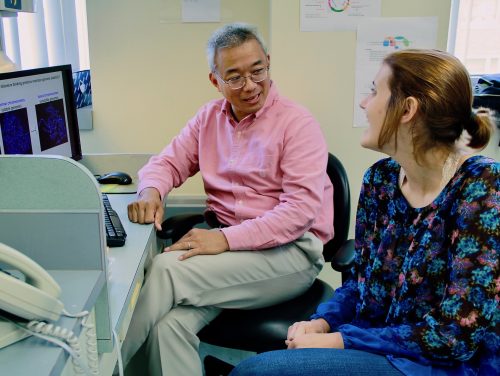Sandy Chang wears a lot of hats. As a professor at the Yale School of Medicine, he signs out clinical cases and runs an NIH-funded research lab studying telomeres and their relationship to cancer and aging. He holds professorships in the Departments of Laboratory Medicine, Pathology and Molecular Biophysics and Biochemistry. Last spring, he was appointed to the role of Associate Dean for Science and Quantitative Reasoning Education at Yale College, a role that involves overseeing the quality of STEM education and administration of undergraduate research fellowships. If that wasn’t enough, he also teaches a popular freshman seminar called “Topics in Cancer Biology.” For Chang, the time he invests is worth it, as his top priority is nurturing future scientists.
Born in Taiwan, Chang moved to Sarasota, Florida at the age of seven, where his love of science blossomed. There, enamored by the vast open skies, he became interested in astronomy. Despite doing astronomy-related research in high school as part of his dream of becoming an astronomer, Chang later found himself drawn toward molecular biology. So, in 1984, he attended a college well-known for its Molecular Biophysics and Biochemistry major: Yale University.
While at Yale, Chang pursued a diverse array of interests, from writing about his undergraduate research for our very own Yale Scientific Magazine to joining the fencing team. He started conducting laboratory research during the summer after his freshman year. Immediately, he noticed the lack of funding resources available for undergraduate students, a problem he would always remember.
Mentorship was key to Chang’s success. During his time in college, Chang found no shortage of mentors, from undergraduate seniors who gave him advice on MD-PhD programs to the principal investigators of research labs who nurtured his love of scientific inquiry. Outside of class, Chang volunteered in the pediatric oncology department at Yale-New Haven hospital, where he had the opportunity to engage with patients. Together, a combination of volunteer work and scientific research led Chang to realize he couldn’t just pursue an MD or a PhD degree—he wanted both.
Chang graduated from Yale in 1988 and went on to the prestigious tri-institutional Weill Cornell/Rockefeller/Sloan-Kettering MD-PhD program. Afterwards, he completed his residency in Clinical Pathology at the Brigham & Women’s Hospital and a postdoctoral fellowship at the Dana Farber Cancer Institute, Harvard Medical School. Chang then moved to Houston, Texas to start his first real job as an assistant professor at the MD Anderson Cancer Center. In 2010, Chang received an opportunity to return to Yale as a tenured Associate Professor at Yale Medical School.
When it comes to scientific research opportunities for students, Chang believes in leveling the playing field. He is a firm believer that anyone who desires to do research should be able to do so, regardless of financial obligations. In particular, the First-Year Summer Research Fellowship provides financial support enabling students to conduct research under the supervision of a Yale faculty member. The fellowship includes a stipend that is more than enough to cover Yale’s summer income contribution, allowing students to focus on their research.
The results of a survey he recently conducted from students who completed the fellowship are promising: over 91% of rising sophomores stated they would continue research in the future. Chang strongly believes that early exposure to quality research opportunities is crucial for fostering a love of science. “The second you find yourself in a research laboratory with an inspirational mentor who guides you, it’s like being bitten by the research bug—you fall immediately in love with the research you are doing,” Chang said. Funding and support from fellowships are just one important component to building foundations for those interested in pursuing research—equally important is mentorship.
For instance, Chang was the first-year advisor to Cayla Broton (ES ’16). Following graduation, Cayla spent a year working with Chang and made important contributions to telomere biology. She is now getting interviews to all top MD/PhD programs. In addition, in his “Topics in Cancer Biology” course, Chang guides first years through reading primary research articles and crafting their own research grant proposals. These are important tools that he believes students will utilize long after they finish the course.
Today, Chang continues to make time for his undergraduates. You will often find him having meals with students. He loves to teach, to mentor, and to foster opportunities for undergraduates to be bitten by that research bug. “It’s a privilege to help students and to watch them blossom into scientists,” said Chang.

